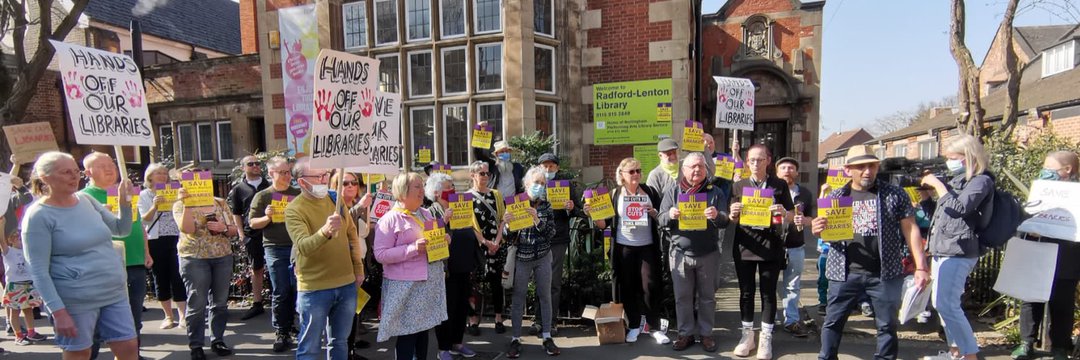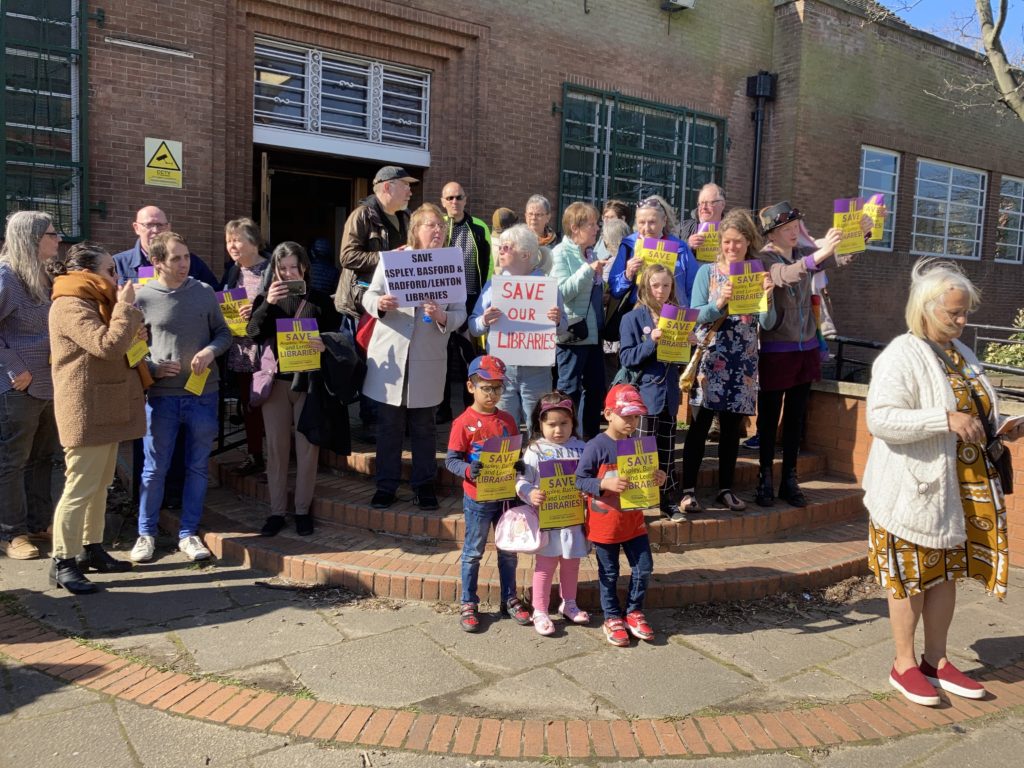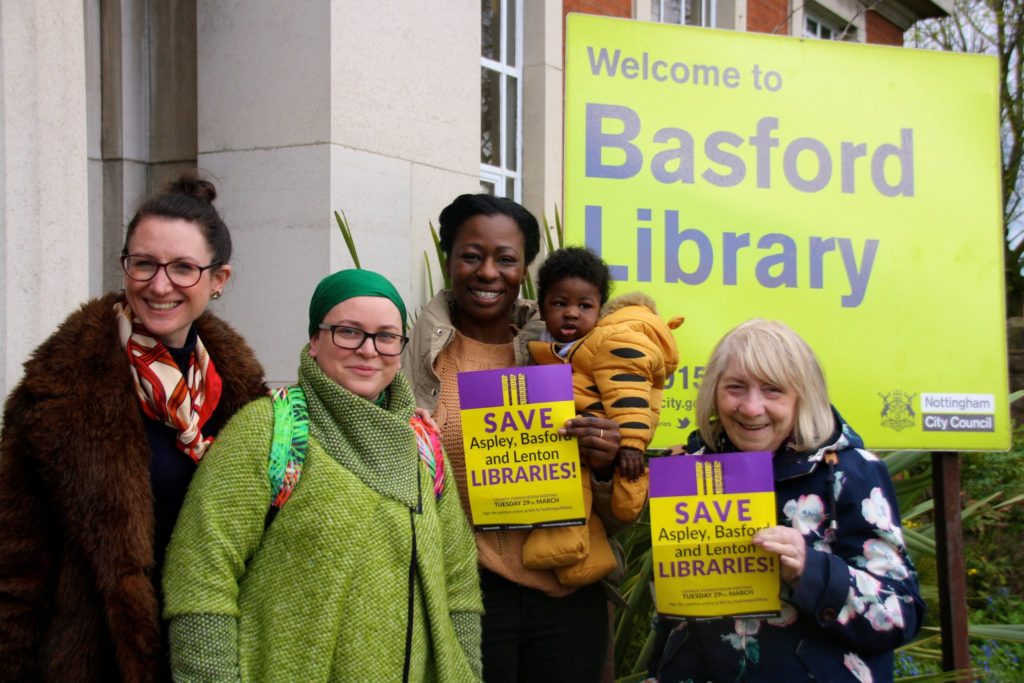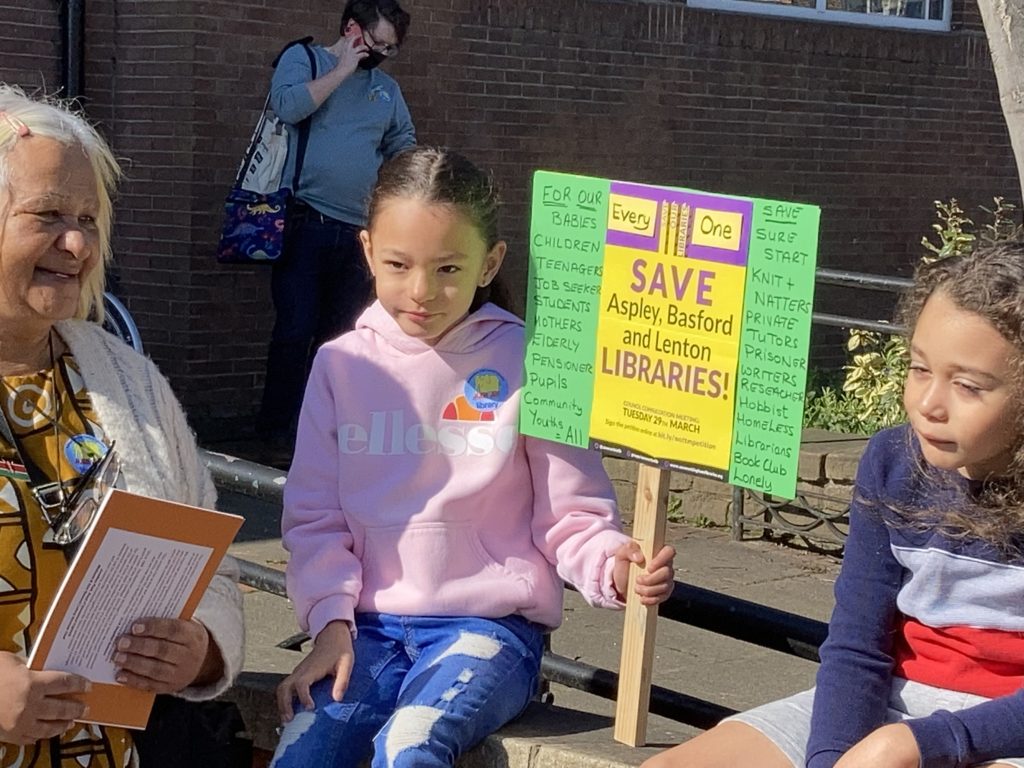Save Nottingham Libraries – why #LibrariesAreEssential to us
Category: #LibrariesAreEssential, #LibrariesAreEssential - Scotland's Stories, Blog

Although our Libraries Are Essential campaign is focused on the Local Government election in Scotland, many of the challenges faced by libraries and their communities are shared across the UK. In this guest blog, Save Nottingham Libraries tell the story of their campaign. Please note that views are those solely of the blog author.
Blog written by Des Conway with support from Chris Cann and Val Wood
Introduction
A group of concerned citizens and activists launched the Save Nottingham Libraries campaign in late January 2022, in direct response to the announcement by Nottingham City Council of their intention to close three community branch libraries. The proposal – which would close the libraries based at Aspley, Basford and Radford-Lenton – is part of the Council’s £28m cuts package which was endorsed by the Labour Group at the Full Council Meeting on Monday 7th March. More details about Nottingham City Council’s library transformation plans, dubbed The Next Chapter, are available here.
The campaign so far has been passionate and wide-ranging and we are confident of saving all three of these wonderful community facilities, which have been cherished by citizens since their respective Foundation Stones were laid in 1926, in the case of Basford and Radford-Lenton, and in 1937 in the case of Aspley. The first two were jointly funded by Carnegie UK and the Nottingham Miners Welfare Committee, with a staggering donation from local miners towards Basford Library of £5,500 for the educational and cultural benefit of the community or to quote from the original charter in the interests of the social well-being, recreation and conditions of workers in or about coal-mines’. That equates to £235,000 in today’s money which ironically approximates the amount the Council hopes to save by closing these fantastic community hubs.
The openings of all three libraries were no doubt grand celebratory events. Miners and their families would have had a role alongside the usual civic dignitaries, at the Basford and Radford-Lenton branch libraries in 1926 due to the mixed funding model used. Over a decade later, the Foundation Stone for Aspley Library was laid on 25th January 1937 by Councillor John Albert Shaw, Chair of the Public Libraries and Museum Committee, and the official opening itself came later the same year, and was unveiled by Principal Harry Wortley of University College Nottingham on 25th November 1937. The choice of this leading local academic to open this trailblazing branch library reinforced the role of libraries as places of learning, individual advancement and above all civic pride.
The campaign holds inclusive organising meetings via zoom every Thursday to plan and coordinate activities. Guests at our first Zoom meeting included library campaigners from Glasgow, who gave us inspiration and ideas. Some of us in Nottingham are seasoned campaigners, whilst others have never campaigned before but cannot bear the thought of losing their libraries. So far, we haven’t paused to choose officials or make rules, but we hit the ground running, with all contributing what we can. The campaign launched its website in early February via Action Network, and the site also includes the petition, which has now attracted over 1800 signatories. We are also well represented on Facebook, Twitter and Instagram, alongside a lively interactive WhatsApp group for activists.
Campaign activities to date
The campaign has been very energetic from the outset, including a well-attended lobby of the City Council Executive Board at its Headquarters Loxley House on Tuesday 22nd February, which was covered by BBC East Midlands Today, Notts TV, and the Nottingham Post.
This was swiftly followed up by another Lobby, this time at The Council House itself on Monday 7th March, at which the Labour Group had its budget proposals endorsed. This event was covered by Bob Walker a reporter from the BBC Radio 4 You and Yours programme, and included clips with the Knit & Natter group based at Aspley Library who talk about the importance of this Library as a brilliant community facility.
In March, the campaign also organised three consecutive well-attended Saturday read-ins starting with Basford Library, followed by Aspley Library (with lots of drivers tooting their vehicle horns in support due to its location) and the final one took place on 26th March at Radford-Lenton Library at which performance poet Manjit Sahota wrote and recited his exhilarating poem ‘Bury Me in Books’. The poem includes a rallying call to our leaders: ‘Take a leaf out of our book. No, no, in-fact, take the Spine and Stand by your Word!’
All three read-ins were covered by the media including on The Politics Show on Sunday 20th March which featured an interview with Henry Normal, and an excellent 2-minute clip on ITV News Central broadcast on the day of the Radford-Lenton read in itself. The Nottingham Post covered the Basford read-in and that article also featured the open letter from 100+ local authors, poets editors and publishers which was sent to Council Leader David Mellen on 15th March. The letter (which also resulted in an interview on Radio Nottingham) was co-ordinated by several individuals including content contributor to this blog (Chris Cann) and Ross Bradshaw (Five Leaves Bookshop) and it highlights the wide-ranging and essential role of libraries given Nottingham’s status as a UNESCO City of Literature.
One of the signatories of the open letter was nature writer Robert McFarlane who took timeout to send a solidarity message to the campaign from Fort William Library no less near Ben Nevis. I have read some of Robert’s evocative books about mountains, rivers and landscapes and it reminded us of the importance of our own urban landscapes represented by facilities such as libraries and leisure centres. On the ‘You and Yours’ broadcast mentioned above one of the Knit and Natter group was Brenda, a woman aged 85, and she said she had been using Aspley Library since her childhood and it was a crucial and familiar part of her town landscape, facilitating her emotional wellbeing.
The City of Nottingham, due to its high level of deprivation, still has one of the worst reading and literacy rates in the UK. Unfortunately, the three libraries earmarked for closure are in some of the most deprived parts of the city and it’s clear to us from our recent read-ins that these facilities offer so much more than just books; they are essential community hubs where lifelong friendships are made. And amidst a cost of living crisis which is only going to get worse, closing such community facilities will compound social disadvantage, loneliness and social isolation.
Levelling Up or Not
We thought it might be interesting to focus on the so-called principle of Levelling Up, another Government inspired sound-bite along with The Northern Powerhouse and The Midlands Engine Room. In the context of UK Libraries, we think this should more aptly be called a Levelling to the Ground agenda, as up to 800 libraries have been closed since austerity measures were introduced in 2010.
Professor Sir Michael Marmot, an international authority on health inequalities at the UCL Institute of Health Equity, stated in August 2021 that if the Government was serious about levelling up it needed to restore all the Local Authority cuts including those affecting libraries and leisure centres as well as early intervention services since 2010. We think the Labour Party nationally and at local Council level including in Nottingham should have done more to promote these arguments at the time. We strongly believe that the billions wasted by the current Government on contentious PPE contracts, would have been better spent supporting Local Councils, writing off some of their debts in the process, so that they could carry on providing the essential services including leisure centres and libraries to their communities. Councils such as Nottingham should be leading the exposure of these ludicrous levelling up claims by central government.
Misnomer
From our perspective, the City Council seems to have adopted this George Orwell 1984 newspeak, with their talk of the next chapter in their library transformation programme. The actual consultation survey – which closes on Sunday 24 April and we encourage folks to complete – is entitled Libraries Transformation Survey. You couldn’t make this up – when have closures of services been presented as transformational?
Most library users have only found out about the intended closure of their libraries from our campaign. Our view is that the entire consultation has been mismanaged, and those of us with more suspicious natures might feel that this is deliberate. The initial questionnaire was difficult to understand and asked technical questions which were possibly designed to scare away many possible respondents. It is reminiscent of Douglas Adams in The Hitch-hikers Guide to the Galaxy: ‘It was on display in the bottom of a locked filing cabinet stuck in a disused lavatory with a sign on the door saying ‘Beware of the Leopard’.’
Furthermore, the Council has only produced the consultation in English and we believe they have made no effort to engage non-English speaking communities. And an online consultation in March with the Council bordered on farce, when registration was closed due to the meeting being ‘full up’; then, after people did manage to register, we had to guess how to find our way in to the online meeting as many of us were unfamiliar with MS Teams. Where was Jackie Weaver when we needed her?
Conclusion
Just to finish, along with several others in the library campaign, I was also involved in another community campaign affecting the Radford-Lenton area in 2021/22 – the Save John Carroll Leisure Centre. The Guardian published an excellent editorial last summer linking these crucial facilities which stated: ‘Leisure Centres are, like libraries or indeed the NHS, a measure of our commitment to all aspects of England’s health and resilience, and to the narrowing of inequalities. They must not be allowed to close’. The campaign couldn’t agree more and we extend this sentiment to the three Nottingham Libraries under threat.
Several of us attended the online consultation in early March and were told that over 1000 citizens had already responded with 7 weeks still left to complete the survey. This figure was updated to 1500 at the open consultation meeting held at City Hall on 29th March at which we submitted several impromptu questions to David Mellen and Nigel Hawkins (NCC Library Lead), and we hope the final figure will be well over 2000 concerned citizens when the survey closes on Sunday 24th April.
We think these completed survey returns, along with our fantastic campaign which has drawn in authors and poets, as well as residents and users, local neighbourhood Schools, ex-library staff, the City of Literature, affected trade unions, and others, will mean that this proposal will be reconsidered by the Council Leadership, resulting in the reversal of these detrimental library closures in the process.
We are firmly of the opinion that these essential community hubs will survive, and benefit current and future citizens with their personal and ‘collective wellbeing’, which incidentally is the motto at the heart of the modern Carnegie UK. And hopefully, the campaign coup de grace will be the deployment this month of Save Nottingham Libraries electronic billboards after a successful crowd-funding project, which will alert many more local citizens – including drivers, passengers, pedestrians and residents – to the Council’s plans and more importantly our determined opposition to them.
Contact information for Save Nottingham Libraries
Campaign website and petition www.savenottinghamlibraries.org
Facebook www.facebook.com/SaveNottmLib
Twitter @SaveNottmLib
Instagram @SaveNottmLib
Official consultation bit.ly/nottmlib


